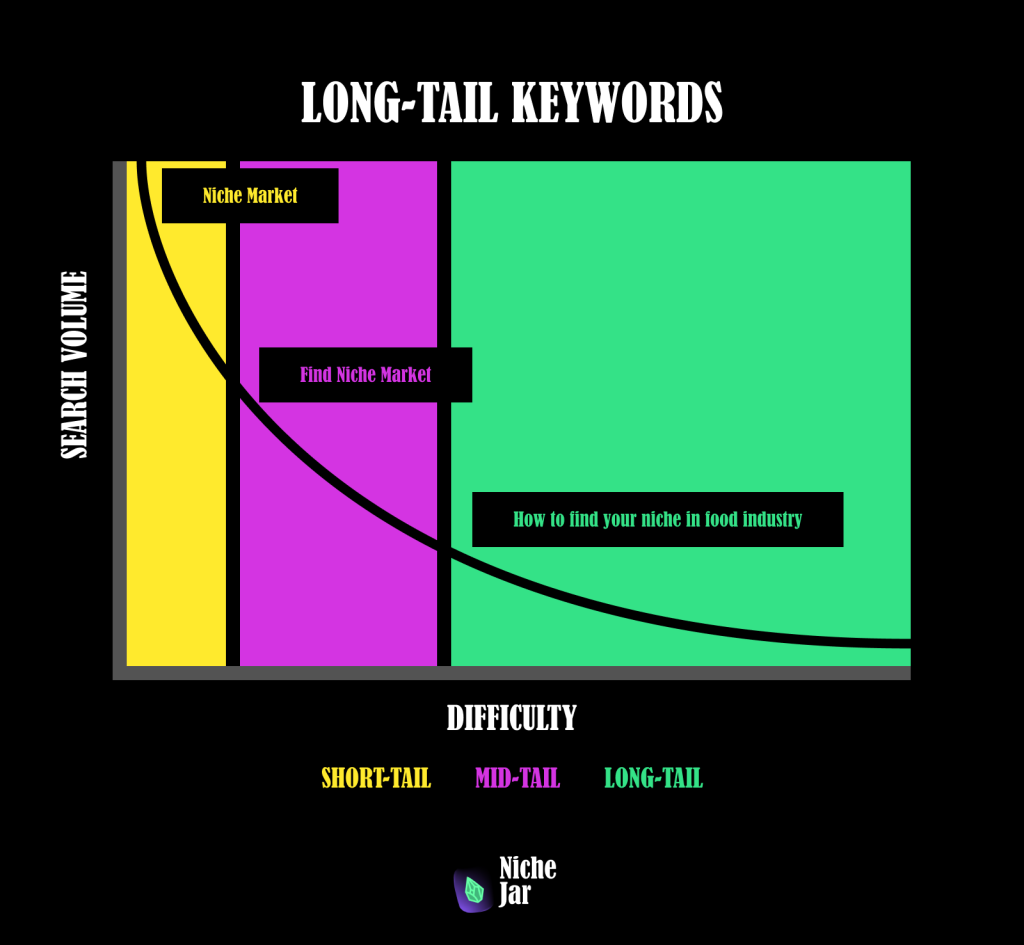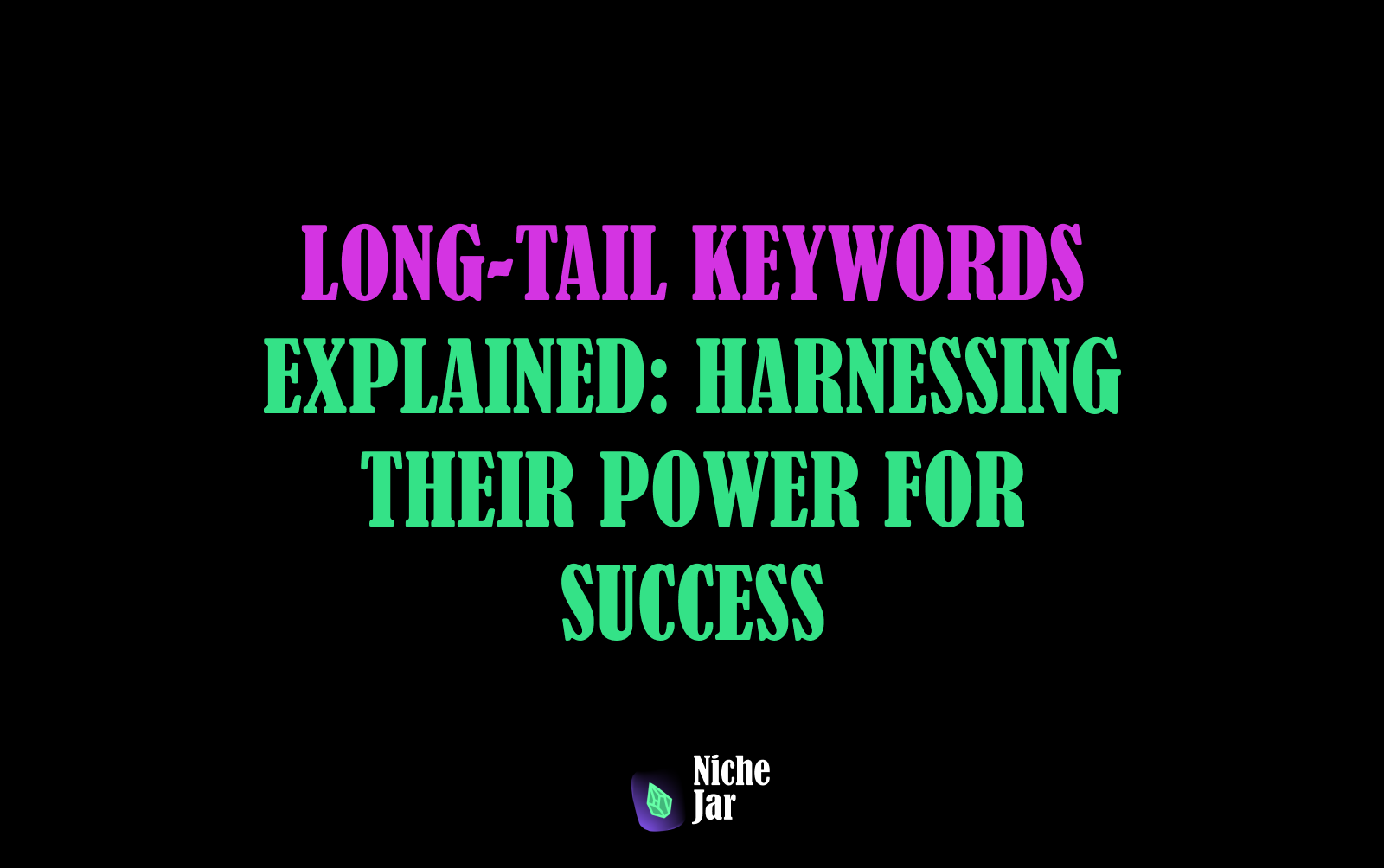- mrpugo
- 0 Comments
- 712 Views
Unlock the potential of long-tail keywords in niche marketing! Discover how these specific and targeted keyword phrases can drive success for your business. Learn how to use long-tail keywords effectively to attract the right audience, boost SEO, and increase conversions. Harness the power of long-tail keywords for lasting success in your niche market.
In the vast landscape of the internet, where countless websites and businesses compete for attention, standing out can be a daunting task. That’s where niche marketing comes into play. By targeting specific segments of the market, businesses can find their unique selling proposition and connect with a more engaged audience. However, discovering the right approach for niche marketing requires a careful understanding of your target audience’s needs and behaviors. One of the most powerful tools in this arsenal is the strategic use of long-tail keywords.
What is a Longtail Keyword
Understanding Long-Tail Keywords
Long-tail keywords are keyword phrases that are longer and more specific than generic, broad keywords. While broad keywords may attract a high search volume, they often lack relevance and fail to capture the intent of the searcher. On the other hand, long-tail keywords have lower search volumes but are highly targeted. They reflect the specific queries users type into search engines when they are looking for precise information or solutions.
Long-tail keywords play a pivotal role in the world of search engine optimization (SEO) and digital marketing. Understanding their significance can be the key to unlocking the full potential of your online presence. In this article, we will delve deeper into the concept of long-tail keywords and explore why they are so crucial for your online success.

1. The Anatomy of Long-Tail Keywords
Long-tail keywords are composed of three main elements:
a) The Head Term: This is the core keyword, which is usually short and generic. For example, “running shoes” is a head term.
b) The Modifier: The modifier adds specificity to the head term. It can be a descriptive word, location, or any other term that refines the search. For instance, “best running shoes for beginners” includes the modifier “best for beginners.”
c) The Intent: The intent represents what the user is trying to accomplish with their search. It defines the purpose behind the search query. For example, the intent in “buy affordable running shoes online” is to make a purchase.
2. The Power of Specificity
While broad keywords have a high search volume, they are often competitive, and it can be challenging to rank for them. On the other hand, long-tail keywords may have lower search volumes individually, but when combined, they make up the majority of searches on the internet. Individually, these keywords may not attract a massive audience, but they do attract a highly targeted and specific audience.
3. Enhanced User Intent Understanding
Long-tail keywords provide valuable insights into the user’s intent. When users search for specific phrases, they are more likely to find precisely what they are looking for. Understanding user intent is crucial for businesses as it helps them align their content and offerings with what their potential customers seek.
4. Less Competition, Better Opportunities
Due to their specificity, long-tail keywords face less competition from other websites and businesses. This presents a unique opportunity for website owners to rank higher in search engine results for these niche queries. As a result, businesses can attract more relevant traffic and potential customers.
5. Driving Quality Traffic
Using long-tail keywords effectively can lead to higher-quality traffic. Visitors who find your website through long-tail searches are more likely to engage with your content, products, or services because they have a clear idea of what they want.
6. The Long-Tail for Content Strategy
Incorporating long-tail keywords into your content strategy can be a game-changer. By creating content that caters to specific queries, you can position yourself as an authority in your niche and build trust with your audience.
Long-tail keywords are a powerful asset in any SEO and content marketing strategy. By focusing on these highly specific and targeted phrases, businesses can drive relevant traffic, understand user intent, and gain a competitive edge. Embrace the potential of long-tail keywords, and you’ll discover a world of opportunities to connect with your audience and achieve online success.
Why Long-Tail Keywords Matter in Niche Marketing
- Precise Audience Targeting: Long-tail keywords allow you to zone in on your niche audience. By aligning your content and offerings with the exact search queries of your potential customers, you increase the chances of attracting highly relevant traffic.
- Less Competition: Generic keywords face fierce competition, making it difficult for new or smaller businesses to rank high in search results. Long-tail keywords, however, have lower competition, offering you a better chance to shine in your niche.
- Higher Conversion Rates: When users search with long-tail keywords, they are usually looking for specific solutions or products. By addressing their exact needs, you demonstrate that you understand their pain points, leading to higher conversion rates.
- Improved SEO and Visibility: Search engines appreciate relevant and valuable content. By incorporating long-tail keywords naturally into your content, you enhance your website’s SEO and increase its visibility in search results.
- Building Authority: Focusing on long-tail keywords allows you to create comprehensive and in-depth content. This expertise and authority in your niche further enhance your reputation and trustworthiness among your audience.
In the realm of niche marketing, long-tail keywords play a crucial role in driving success and gaining a competitive edge. These highly specific keyword phrases can make all the difference when it comes to attracting the right audience and maximizing conversions. Let’s explore why long-tail keywords matter in niche marketing:
1. Precise Audience Targeting
Understanding your niche audience is paramount, and long-tail keywords enable you to do just that. By incorporating specific phrases that align with the exact search queries of your potential customers, you can effectively target those who are actively seeking what you offer. This precision increases the chances of attracting highly relevant traffic to your website or platform.
2. Less Competition, Better Visibility
In the vast ocean of the internet, generic keywords face fierce competition. It can be challenging for new or smaller businesses to rank high in search results when using broad terms. Long-tail keywords, however, have lower search volumes and, consequently, encounter less competition. Embracing these specific phrases allows you to stand out in your niche, capturing the attention of your target audience more effectively.
3. Higher Conversion Rates
Long-tail keywords have a significant impact on conversion rates. When users utilize such specific search queries, they are usually looking for particular solutions or products. By tailoring your content and offerings to address their exact needs, you demonstrate a clear understanding of their pain points. This understanding fosters trust and credibility, which, in turn, leads to higher conversion rates and increased customer loyalty.
4. Improved SEO and Visibility
Search engines aim to provide the most relevant and valuable results to their users. By naturally incorporating long-tail keywords into your content, you signal to search engine algorithms that your website is a valuable resource for specific information or products. As a result, your website’s SEO improves, and its visibility in search results increases. This positive reinforcement from search engines can further elevate your position in your niche.
5. Building Authority and Trust
Focusing on long-tail keywords allows you to create comprehensive and in-depth content. When you consistently produce valuable resources that cater to specific needs within your niche, you position yourself as an authority in the field. This expertise enhances your reputation and trustworthiness among your audience, fostering long-term relationships and encouraging brand advocacy.
Conclusion
In niche marketing, leveraging the power of long-tail keywords can transform your digital strategy. The ability to precisely target your audience, combined with reduced competition, leads to increased visibility and higher conversion rates. By demonstrating your expertise and building trust, you solidify your position as a respected authority within your niche. Embrace the potential of long-tail keywords, and you’ll discover a world of opportunities to thrive in the world of niche marketing.
Strategies for Using Long-Tail Keywords in Niche Marketing
- Keyword Research: Conduct thorough keyword research to identify long-tail keywords that align with your niche and have reasonable search volumes. Use keyword research tools and analyze the language your target audience uses.
- Content Optimization: Create high-quality content that addresses the specific needs of your niche audience. Incorporate long-tail keywords naturally into your blog posts, product descriptions, and landing pages.
- Blog Posts and Articles: Craft informative and valuable blog posts around long-tail keywords to attract organic traffic and establish your authority in the niche.
- Product Descriptions: Optimize your product descriptions with relevant long-tail keywords to improve the visibility of your products in search engines and marketplaces.
- Landing Pages: Create targeted landing pages for specific niche products or services, optimizing them with long-tail keywords to drive qualified leads.
- Social Media Engagement: Leverage long-tail keywords in your social media posts and advertisements to reach a highly targeted audience and increase engagement.
- Email Marketing: Segment your email list based on niche interests and use long-tail keywords in your email subject lines and content to boost open rates and click-through rates.
- Optimize Meta Tags: Incorporate long-tail keywords into your meta titles and meta descriptions to improve your website’s click-through rates in search engine results.
- User-generated Content: Encourage user-generated content that includes long-tail keywords related to your niche. User reviews, testimonials, and discussions can attract like-minded customers.
- Monitor and Refine: Keep a close eye on the performance of your long-tail keywords. Analyze which keywords are driving the most traffic and conversions, and refine your strategy accordingly.
- Competitor Analysis: Research your competitors to identify the long-tail keywords they are targeting successfully. This can provide valuable insights and inspiration for your own niche marketing efforts.
- Local SEO: If your niche products or services have a local audience, include location-based long-tail keywords to attract customers from specific geographic areas.
- Long-Tail for Voice Search: With the rise of voice-activated devices, optimize your content for long-tail keywords that mimic natural language and conversational queries.
- Long-Tail for FAQs: Anticipate the questions your niche audience might have and incorporate long-tail keywords into your Frequently Asked Questions (FAQs) section to provide helpful answers.
Remember that while long-tail keywords are essential for niche marketing, striking a balance is crucial. Don’t overstuff your content with keywords; focus on providing value and relevance to your audience. With a well-executed long-tail keyword strategy, you can elevate your niche marketing efforts, attract the right audience, and achieve sustainable growth in your niche market.
Final Thoughts
In the world of niche marketing, understanding your audience and their unique requirements is paramount. Long-tail keywords serve as a crucial bridge between your niche offerings and your audience’s search intent. By leveraging the power of long-tail keywords, you can elevate your niche marketing strategy, attract the right visitors, and ultimately boost conversions and revenue. Embrace the long-tail and unlock the true potential of your niche business!
Find amazing niche opportunities 10x faster! 🌟
Tired of sifting through endless data to find the perfect niche? Look no further! NicheJar has the magic key to unlock in-depth insights and uncover profitable niches in a flash. ⏱️ Say goodbye to days of endless searching and welcome a faster time to revenue!






